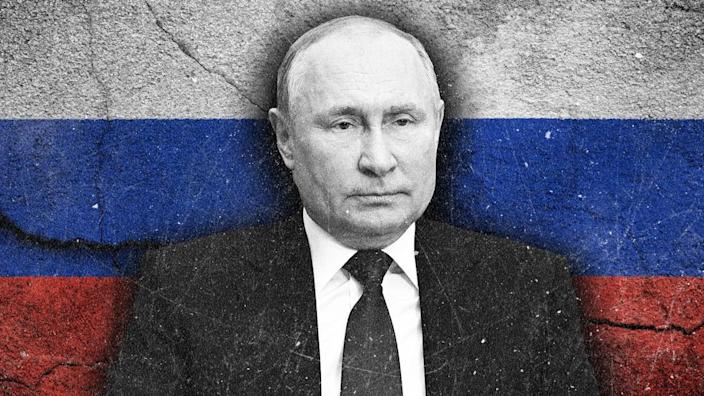
Tens of thousands of refugees have fled the brutal regime of Vladimir Putin as outspoken critics and quiet Russian dissenters sneak past border guards to escape the Kremlin’s ever stricter crackdowns.
One of those emigrés, who we’ll call Anna, arrived in Brussels just a few days after the invasion of Ukraine to seek shelter with her friend Elena, a young Russian who had moved to Belgium some years earlier.
It was a WhatsApp message from Anna that told Elena their world had just been turned upside down.
Anna, who lives in Moscow, messaged to say she was in the bank withdrawing all the money from her account. “The war has started,” she wrote. Elena spent the rest of the day crying, unable to believe that her country had really invaded Ukraine.
Russia’s Latest Atrocity Unleashed Nitric Acid Cloud That Could Blind Ukrainians
Within days Elena welcomed her friend into her apartment. As a Russian, she has no refugee rights in Europe, unlike the Ukrainians fleeing Putin’s horrific war.
The exact number is unknown, but thousands of Russians have left the country since the beginning of the war for fear of persecution or because they feel they can no longer live in their country. They feel suffocated.
Elena doesn’t believe she will be able to return home until President Putin has gone.
Meanwhile, she helps her friend and also sees her other friends leaving Russia—some have gone to Armenia, others to Turkey and Georgia. A diaspora of Russian refugees is being formed.
Those who decide to stay—either with the intention of challenging the regime or because they have no means of leaving the country—report a climate of fear and desperation.
“Since February 24, life has changed,” said Inna, a psychologist whose son, at military age, could be called up at any time to fight. She’s been having trouble sleeping or focusing on anything “I try not to read the news anymore, but it’s impossible to close myself in the house like a snail and stop feeling and empathizing.”
Police officers detain a woman during an unsanctioned protest rally over Putin’s invasion of Ukraine at the Pushkinskaya Square on Feb. 27 in Moscow.
” data-src=”https://s.yimg.com/ny/api/res/1.2/0RLe_iW_35L8KElLW1XLeA–/YXBwaWQ9aGlnaGxhbmRlcjt3PTcwNTtoPTQ0NQ–/https://s.yimg.com/uu/api/res/1.2/nRar8vjeWwjtmCjkfhQO3A–~B/aD03Mzk7dz0xMTcwO2FwcGlkPXl0YWNoeW9u/https://media.zenfs.com/en/thedailybeast.com/658c5d846672faa65bda0ea13eb8b3de”><img alt="
Police officers detain a woman during an unsanctioned protest rally over Putin’s invasion of Ukraine at the Pushkinskaya Square on Feb. 27 in Moscow.
” src=”https://s.yimg.com/ny/api/res/1.2/0RLe_iW_35L8KElLW1XLeA–/YXBwaWQ9aGlnaGxhbmRlcjt3PTcwNTtoPTQ0NQ–/https://s.yimg.com/uu/api/res/1.2/nRar8vjeWwjtmCjkfhQO3A–~B/aD03Mzk7dz0xMTcwO2FwcGlkPXl0YWNoeW9u/https://media.zenfs.com/en/thedailybeast.com/658c5d846672faa65bda0ea13eb8b3de” class=”caas-img”>
Police officers detain a woman during an unsanctioned protest rally over Putin’s invasion of Ukraine at the Pushkinskaya Square on Feb. 27 in Moscow.
Konstantin Zavrazhin/Getty
She said that she worries her son might be drafted, but also, Inna explained, “I don’t not want our boys from poor villages to go like cannon fodder and become murderers.”
Like many Russians, she has friends in Ukraine. One of them lost his wife and 10-year-old daughter in Mariupol.
“We were brought up in Soviet times, we grew up with the phrase ‘if only there was no war,’ and now I am shocked by how many of my compatriots support this war. Whenever possible, when ordinary people write to me from Ukraine, I ask for forgiveness. We are to blame for allowing this.”
But there’s room for hope. Inna says, with a hint of excitement, that “some of my acquaintances who previously supported Putin’s policy began to realize what was happening.”
In St. Petersburg, Katya, an activist, said that day the war started “was a day of horror, fear and tears, the first message I wrote to family and friends: “‘Russia has invaded Ukraine, [the war] has begun.’ I wrote this with tears in my eyes, considering myself a fascist, that evening I went out into the street, shouting ‘no to war’ until I was hoarse.”
She went out several times to protest and challenge the regime until she was arrested and interrogated by an agent of the federal security service (the dreaded FSB) and a counter-terrorism officer.
“They tortured me with brutal interrogation, tried to access my cell phone to find out what [Telegram] channels I participated in. They said I was one of the organizers of the protest, but I didn’t organize anything. They said I was on their special list and threatened to sue me for spreading fake news, a crime in the country, if I opened my mouth to defend Ukraine,” Katya said.
She spent 24 hours in detention without being able to even contact a lawyer and said that “it was a kind of horror.”
Police block Red Square ahead of a planned unsanctioned protest against Russia’s invasion of Ukraine in central Moscow on Feb. 24.
” data-src=”https://s.yimg.com/ny/api/res/1.2/VsmF41tV4TjHomj8u7bxTw–/YXBwaWQ9aGlnaGxhbmRlcjt3PTcwNTtoPTQ2OQ–/https://s.yimg.com/uu/api/res/1.2/MhSBgkgqtei3chpzQ0MwNg–~B/aD03Nzg7dz0xMTcwO2FwcGlkPXl0YWNoeW9u/https://media.zenfs.com/en/thedailybeast.com/e2a868f41e8bdd5a941ae8c5ccf348ae”><img alt="
Police block Red Square ahead of a planned unsanctioned protest against Russia’s invasion of Ukraine in central Moscow on Feb. 24.
” src=”https://s.yimg.com/ny/api/res/1.2/VsmF41tV4TjHomj8u7bxTw–/YXBwaWQ9aGlnaGxhbmRlcjt3PTcwNTtoPTQ2OQ–/https://s.yimg.com/uu/api/res/1.2/MhSBgkgqtei3chpzQ0MwNg–~B/aD03Nzg7dz0xMTcwO2FwcGlkPXl0YWNoeW9u/https://media.zenfs.com/en/thedailybeast.com/e2a868f41e8bdd5a941ae8c5ccf348ae” class=”caas-img”>
Police block Red Square ahead of a planned unsanctioned protest against Russia’s invasion of Ukraine in central Moscow on Feb. 24.
Alexander Nemenov/AFP via Getty
Via Telegram, Sophia, a camera operator from Moscow, explained to The Daily Beast that “practically everything has changed” since the war began. In addition to the price hike, almost all foreign stores have closed.
Dozens, if not hundreds of brands and companies have left Russia with no prospect of return. The biggest losers are ordinary citizens. “This all sounds very apocalyptic,” Sophia exclaims, also saying that “it feels like you have to get used to living with a depression-like feeling.”
She said she felt “incredibly ashamed because my country is doing horrible things that cannot be justified. It is a terrible crime that will not be easily forgiven or forgotten.”
The feeling is like “if a big part of you has died, you keep doing your things in automatic mode, but you see no purpose. You wake up and find that you have no more future and at the same time you understand that you’re not the one being bombarded, that there are people suffering much more at this time,” she said.
And despite all the hardships Sophia opposes the war and Putin saying that he destroyed two countries, Ukraine with bombs and the Russian economy, “and our future.”
Hiding in an undisclosed location, opposition politician Aleksei Miniailo talks hurriedly on the phone. Nervous, he knocks over what he had on the table while frantically typing messages on his computer to friends and other activists.
Miniailo wants his name to be published as “it’s a way to protect myself, after all I’m a public person.” But it is hard to know if he will have any kind of protection if he is caught by the police. A historian from Moscow State University, he joined the hunger strike organized by Lyubov Sobol, a lawyer and close aid to Alexei Navalny in 2019. In the same year, Miniailo was jailed for two months on charges of promoting protests.
Russian Families Are Disowning Each Other Over Putin’s War
Now, he works with a group of academics, researchers, activists, and professionals carrying out a project in which they analyze opinion polls critically.
“We survey public opinion in Russia and explain it. The raw numbers are misleading because the country is at war, because in autocracies and dictatorships polls are not really representative of public opinion,” he explained.
Miniailo’s day-to-day life is one of trying to stop the war. From his hiding place he talks to people, tries to persuade them to act and stop the war before Russians face even more dire consequences.
An inscription reading “No to war” is seen on an advertisement board as riot police officers stand guard nearby during a protest against Russia’s invasion of Ukraine in central St. Petersburg on March 2.
” data-src=”https://s.yimg.com/ny/api/res/1.2/od06qtyLzqQyCbxJHYDwMw–/YXBwaWQ9aGlnaGxhbmRlcjt3PTcwNTtoPTQ1MQ–/https://s.yimg.com/uu/api/res/1.2/5jBlwR5poD6AlhbmEDYP6g–~B/aD03NDk7dz0xMTcwO2FwcGlkPXl0YWNoeW9u/https://media.zenfs.com/en/thedailybeast.com/58f1b0573a486597f3f75d385d7190ff”><img alt="
An inscription reading “No to war” is seen on an advertisement board as riot police officers stand guard nearby during a protest against Russia’s invasion of Ukraine in central St. Petersburg on March 2.
” src=”https://s.yimg.com/ny/api/res/1.2/od06qtyLzqQyCbxJHYDwMw–/YXBwaWQ9aGlnaGxhbmRlcjt3PTcwNTtoPTQ1MQ–/https://s.yimg.com/uu/api/res/1.2/5jBlwR5poD6AlhbmEDYP6g–~B/aD03NDk7dz0xMTcwO2FwcGlkPXl0YWNoeW9u/https://media.zenfs.com/en/thedailybeast.com/58f1b0573a486597f3f75d385d7190ff” class=”caas-img”>
An inscription reading “No to war” is seen on an advertisement board as riot police officers stand guard nearby during a protest against Russia’s invasion of Ukraine in central St. Petersburg on March 2.
Olga Maltseva/AFP via Getty
“Putin thought he was going to win this war in Ukraine in a few days, but he miscalculated. What I see now is more like the war in Chechnya in 1994,” Miniailo said.
To him, the main problem is that “Ukraine is the closest country to Russia, it’s a brotherly people. 20 percent of Russians have relatives in Ukraine. And if we can’t dialogue with Ukraine, but prefer to launch rockets, how can we find common ground with any other country?”
This is why he is dedicated to digging deeper into the opinion polls. He believes that people are terrified, they cannot understand what is happening.
In Reutov, in the outskirts of Moscow, journalist and human rights activist Evgeny Kurakin also asked for his name to be published. “I have been persecuted for my professional activities for 11 years,” he said with a certain indifference, adding that he has already been recognized as a political prisoner by the human rights organization Memorial—an organization that has been forced to shut down in one of Putin’s latest crackdowns.
“After being thrown out of the Council of Europe, we have been deprived of the right to appeal the decisions of Russian courts: The prospects in Russia have become completely bleak,” Kurakin said.
Whispers are heard everywhere. Even if they cannot raise their voices, society discusses the events and is not satisfied. The consequences are very heavy, and the propaganda is so blatant that people begin to distrust the authorities.
“I can speak based on my friend, I provide them with alternative information, and today they are already starting to question and ask the right questions. All is not lost,” he says with undisguised joy.
Like Sophia, he views the situation with some pessimism for the immediate future but believes that “the regime has hastened its demise,” and that it will not be sustained forever.
Get the Daily Beast’s biggest scoops and scandals delivered right to your inbox. Sign up now.
Stay informed and gain unlimited access to the Daily Beast’s unmatched reporting. Subscribe now.




